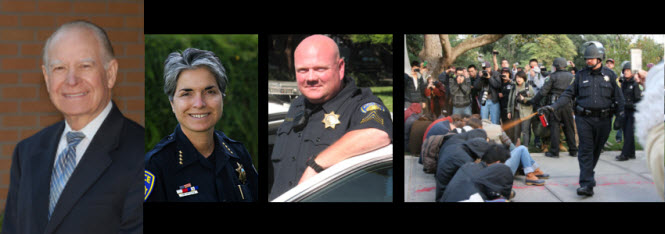
On Tuesday the General Counsel of the University of California, Charles Robinson, along with Michael Risher for the ACLU, submitted their arguments in response to the injunction sought by lawyers for Lt. John Pike and the Federated University Police Officers Association, who filed for an injunction last week to halt the release of the Kroll Investigation Report and any recommendations from the task force headed up by Cruz Reynoso.
In the order signed last week by Judge Grillo, the University of California Board of Regents was ordered “to show cause why a preliminary injunction should not be ordered restraining and enjoining you and your employees and agents… from releasing the Kroll report, from releasing confidential peace officer personnel files, and from violating California Penal Code sections 832.7 and 832.8 regarding the confidentiality of peace officer personnel files.”
Attorney John Bakhit, representing Lt. John Pike of the Federated University Police Officers Association, filed a motion under PC sections 832.7 and 832.8 to prevent “the unlawful release of confidential peace officer personnel information” by the University of California through the Kroll report.
However, the University of California draws a distinction between what they call the Kroll/Reynoso Report and the internal investigation. The chief distinction is that the internal investigation would impose sanctions while the Kroll/Reynoso report not only does not include personnel records but is only advisory.
Last week, the ACLU also intervened into this dispute. They argue, “American Civil Liberties Union of Northern California believes that the prompt release of the report is necessary to allow an informed public debate about this notorious incident.”
Their brief continues: “It asks this Court not to further delay release of it, because the people of this state have a right to information about the official conduct of public officials under Article I § 1 of the California Constitution, and Plaintiffs have failed to show that publication of the report will violate their statutory or constitutional rights.”
“To the contrary,” their brief argues, “the authorities that Plaintiffs cite shows that the Legislature’s goal in enacting protections for peace-officer records was to protect officers from unwarranted intrusion into personnel matters, not to prevent an agency from promoting transparency and accountability.”
Attorney Charles Robinson, General Counsel for the University of California, argues that the contention by Mr. Bakhit this “report comprises or includes a peace officer ‘personnel record’ that must be kept confidential under Penal Code section 832.7… is erroneous.”
Instead, he argues that there is a separate Internal Affairs investigation and that the plaintiffs are “under the mistaken impression that Kroll was retained to perform the function of an IA investigation” and “make conclusions regarding alleged misconduct by Plaintiffs/Petitioners.”
“No so,” they argue. “The Kroll/Reynoso Report was developed independently of the IA investigation and does not include personnel records of any peace officer.”
They add, “The Kroll/Reynoso Report is informational and advisory. It is not binding on the University, on Plaintiffs, or on anyone else. It is intended to provide a factual and informed presentation to the public to answer the questions ‘How did this happen?’ and ‘How can we prevent this from happening again?’ “
The Kroll/Reynoso report, they argue, “does not address the issue of discipline to be imposed, if any, on individual officers for use of force that occurred on November 18” and that “the Charge to the Task Force did not include recommendations for disciplinary action.”
Mr. Robinson adds that there is a concurrent Internal Affairs investigation that would address any disciplinary action for the police officers.
But according to arguments from Mr. Bakhit on behalf of Lt. Pike, under Penal Code section 832.7(a), “Peace officer or custodial officer personnel records and records maintained by any state or local agency pursuant to Section S32.5, or information obtained from these records, are confidential and shall not be disclosed in any criminal or civil proceeding except by discovery pursuant to Sections 1043 and 1046 of the Evidence Code.”
They add that personnel records represent “”any file maintained under that individual’s name by his or her employing agency and containing records relating to ‘any one of several categories of information.’ Most notable: “Employee advancement, appraisal, or discipline,” or “Complaints or investigations of complaints.”
They further note that, under section 832.8, “the confidentiality provided by these Penal Code provisions extends to the administrative appeal hearings of peace officers where those officers are appealing disciplinary actions.”
However, UC counters, “Penal Code section 832.7 has never been applied to a document analogous to the Kroll/Reynoso Report, and the statute should not be applied here.”
UC argues that the report is analogous to, though less dramatic than, the Christopher Commission report which in the early 1990s was commissioned by Los Angeles’ Mayor following the beating of Rodney King.
UC’s attorney argues: “There has never been any question that the Christopher Commission Report was an appropriate response by the City of Los Angeles to the public’s right to know the facts and circumstances of a widely publicized incident. There could be no legitimate contention the Report was a ‘personnel record’ of the officers involved.”
They add, “The University’s ability to be responsive and address the legitimate concerns of students, faculty, and other constituents will be severely hampered” if this were deemed confidential.
The ACLU’s argument against the injunction focuses on the right of the people’s access to information regarding the conduct of public business.
“Plaintiffs cannot prevent the release of the reports unless they prove that a specific law prohibits the University from releasing them,” Mr. Risher argues.
State law, he argues, creates a “presumption of openness” in government records. “This presumption means, that all public records must be made available to the public unless they fall within an exception to disclosure.”
The ACLU insists that the plaintiff’s argument that the disclosure is prohibited under the penal code sections that relate to officer personnel files along with their right to privacy fails, for two primary reasons that relate to their failure “to sustain their burden of proving that either exception applies.”
First they argue, “Plaintiffs have not presented any convincing argument that the report contains confidential peace officer personnel records.”
In fact, we learned last week that the TRO (temporary restraining order) was filed prior to either the officers or their attorney having read the report.
The ACLU continues essentially that, even if it does contain any personnel records, “the overwhelming public interest in favor of their disclosure far outweighs any privacy intrusion that would arise from the disclosure of ‘negative’ information about misconduct by on-duty peace officers.”
Moreover, the ACLU makes a similar argument to UC’s when it says, “The Reports are not confidential peace officer personnel records because they are agency-initiated, special investigations designed to develop policy recommendations.”
They cite from PC Sections 832.7 and 832.8 that “prohibit dissemination of peace officer personnel files, which the statute defines as including records of citizen complaints and investigations into them and records relating to disciplinary matters.”
The ACLU argues that these provisions would not apply to the reports “because they do not relate to citizen complaints. Instead, the Reports are agency-initiated, special investigations intended to shed light on what went wrong, and designed to undertake a systemic· review of a critical incident, with an eye to developing policy recommendations to prevent a repetition of an event that has caused grave damage to the reputation of the University.”
They later add, “These confidentiality provisions are inapplicable to records that do not reveal information relating to disciplinary matters or citizen complaints.”
The arguments by both the ACLU and the University of California clearly hone in on a key point. The key point is whether this report contains actual personnel information.
This argument is embedded in Mr. Bakhit’s brief, as well.
Specifically, he says that in this case, “The investigative materials and findings in the Kroll report constitute confidential personnel records.”
But the question is whether they really do. UC does a good job of separating the internal investigation from the Kroll/Reynoso report and argues that it does not contain anything from the officer’s personnel files.
But Mr. Bakhit goes further to argue: “This case does not involve a situation in which the Regents intend to simply release the name of officers involved in a critical incident. Instead, the Regents intend to release a comprehensive report including [information] based on misconduct complaints against several police officers.”
He adds, “Perhaps most disturbing is the fact that the report includes the compelled statements of many of those officers.”
If he can show that, then perhaps he has a point. But from what we understand, the attorney for Lt. Pike had no idea what was in the report and may be conflating the Internal Affairs report with the Kroll/Reynoso report.
As the ACLU argues, “The Reports at issue here have nothing to do with .the disciplinary process or with the investigation of citizen complaints. Plaintiffs’ own evidence makes it clear that the University has informed plaintiffs that it will not use any information they have provided in any disciplinary proceeding.”
The ACLU cites the Bakhit declaration itself: “The University of California, including UC Davis, will not use any information that you provide to Kroll against you in any disciplinary proceeding.”
“Nor do the reports involve citizens’ complaints,” the ACLU continues. “The reports in this case were initiated by the University itself, at the highest levels to promote the goals of transparency and accountability.”
Thus they argue, “The agency-initiated reports at issue here – intended to provide the public with an understanding of deeply troubling events and to provide the agency with an opportunity to learn from its mistakes- bear no resemblance to the type of citizen-initiated complaints of individual officer misconduct with which the Legislature was concerned when it enacted Sections 832.7 and 832.8, laws that it passed to prevent criminal defendants from filling officers’ personnel files with frivolous complaints that would then become public.”
It would seem that it will be difficult to sustain the claim that this report releases confidential personnel records. The event happened in public, it was not generated from a citizen complaint, and it is separate and distinct from the concurrent internal investigation into the matter.
As the ACLU puts it, “The reports at issue here are not confidential personnel records because they do not involve officer discipline or an investigation of a citizen complaint.”
UC makes very similar claims, arguing, “The Kroll/Reynoso Report does not fall within the statutory scheme providing for confidentiality.”
And they noted that this report does not contain any information from a police officer’s “personnel records.”
“The Kroll/Reynoso Report does not purport to reflect any information obtained from personnel files of officers, administrators, or any other persons mentioned in the report,” UC argues.
As such, Lt. Pike has to show that the report itself, reflecting on public events caught on video, would somehow constitute a de facto personnel file and that seems difficult to sustain, particularly in light of the overwhelming public need to know in this case.
And UC argues, “The mere fact that the tent-removal operation on November 18, 2011, has been the subject of widespread comment and criticism cannot transform the Kroll/Reynoso Report into a ‘personnel record.’ “
They add, “If the subject matter were sufficient, the Plaintiffs would be entitled to prevent the Defendants from disclosing media reports covering the same facts and criticisms.”
—David M. Greenwald reporting






David,
Thanks for reporting on this, the most important story in this community. I am guessing there is an online version of the source documents. Could you please provide a link to it. Thanks.
They are sort of available on the court website. If I get ahead of things, perhaps I can upload and post them today.
Having read the various posts and articles on the motion filed by Mr Bakhit it seems that the main reason he filed the motion was to give him (the Federated University Police Officers Association and Lt Pike) access to the Reynoso Task Force and Kroll reports before they were released to the public.
If I understand everything I have read, the FUPOA and individual police officers were not shown the reports before they were to be released. If this is the case, how could they argue that the reports contained police personnel information? Further, it appears that the judge’s injunction gives them access to the reports. It seems they have already gotten what they want.
[quote]As such, Lt. Pike has to show that the report itself, reflecting on public events caught on video, would somehow constitute a de facto personnel file and that seems difficult to sustain, particularly in light of the overwhelming public need to know in this case.[/quote]
Because we don’t have access to the report, it is really difficult to say if it constitutes a “de facto personnel file”. A judge will have to sort it out…
“A judge will have to sort it out…”
I guess that’s why the matter is before a judge.
[quote]I guess that’s why the matter is before a judge.[/quote]
Yes, a judge who will look at the situation objectively, and not through bias-colored glasses…
A consideration: the issue is the content and the nature thereof, right? IF, confidential information is in any report it can’t be disclosed no matter the form. It makes me think of HIPPA. The substance — data — is what is protected not the form — type of report — …if a patients confidential records are protected it does not matter that a hospital had an agent publish it. The patient’s confidential records would be illegally published.
That’s true. UC is claiming no such information is in the report. Lt. Pike and his attorney hadn’t seen the report. So that’s where we stand.
“Yes, a judge who will look at the situation objectively, and not through bias-colored glasses… “
I guess their argument must be pretty sound if this is all you are coming up with.
“”American Civil Liberties Union of Northern California believes that the prompt release of the report is necessary to allow an informed public debate about this notorious incident.”
This argument and those similar that follow are political arguments, not legal. The University argument, by contrast, is arguing the legal merits and the lack thereof.
This law has been in place for decades and has been argued from many perspectives. The original legislative intent was to afford protections to peace officers being scrutinized by internal investigations. Presumably, an internal investigation is under way, but is not being attacked, yet.
A legal claim and objection is being made on the presumed content of a report that has not yet been seen by the claimants. I wonder how any claimant can gain standing in a court for an unsubstantiated fear. We’ll see. The intimate ruling will be groundbreaking regardless of what it is.
[quote]ERM: Yes, a judge who will look at the situation objectively, and not through bias-colored glasses… ”
DMG: I guess their argument must be pretty sound if this is all you are coming up with.[/quote]
Huh? All I am saying is that an OBJECTIVE judge will take a look at the actual report, determine if there really is any personnel information in there, and issue an appropriate ruling. If any of the report is redacted, I would argue the police were in the right. If none of the report is redacted, then the ACLU and University are in the right. But none of us can know, since we have not seen the report. I would also argue if any of the report is redacted, Cruz Reynoso and his investigative team should have been a bit more careful. If on the other hand none of the report is redacted, then it certainly could be argued that Cruz Reynoso did exactly what he was supposed to do, and was stonewalled by the police. Let’s wait and see what the judge determines…
[quote]A consideration: the issue is the content and the nature thereof, right? IF, confidential information is in any report it can’t be disclosed no matter the form. It makes me think of HIPPA. The substance — data — is what is protected not the form — type of report — …if a patients confidential records are protected it does not matter that a hospital had an agent publish it. The patient’s confidential records would be illegally published.[/quote]
Good analogy…
Thanks ERM…
I must correct myself… Should be HIPAA
Health
Insurance
Portability &
Accountability
Act
I’m glad to learn that a judge will be making a timely decision whether the police union’s restraining order has any merit regards protection of personnel records or is simply stonewalling on the part of responsible parties. I’m reasonably sure Cruz Reynoso is versed in the law well enough not to include personnel information in a public report that would violate P.C. 832.7-8.
For some reason (perhaps a previous article) I seem to remember that the judge’s ruling is due out tomorrow (Friday). Does anybody know if this is the case?
Looks like the Judge agreed with the ACLU and UC: link ([url]http://davisvanguard.org/index.php?option=com_content&view=article&id=5182:tentative-ruling-denies-police-efforts-to-block-pepper-spray-report&catid=63:law-enforcement&Itemid=114[/url])